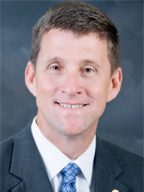9/14/2010 - Jackson, Miss.
U.S. Senate Resolution 595, co-sponsored by U.S. Senators Thad Cochran and Roger Wicker, designates the week of Sept. 12, 2010, as “National Historically Black Colleges and Universities Week.”
By Dr. Hank M. Bounds
Commissioner of Higher Education
 As Americans, we all share the dream that the lives of our children will be better than our own. Each generation of Americans has hoped that its children will be happier, more prosperous and more secure as they become adults and rear their own families. Education has been the ladder to making the American Dream come true. Generations of American children have climbed from poverty to prosperity through a college education. The strength of our nation rests in the ambition of our children and the accessibility of our colleges and universities.
As Americans, we all share the dream that the lives of our children will be better than our own. Each generation of Americans has hoped that its children will be happier, more prosperous and more secure as they become adults and rear their own families. Education has been the ladder to making the American Dream come true. Generations of American children have climbed from poverty to prosperity through a college education. The strength of our nation rests in the ambition of our children and the accessibility of our colleges and universities.
Perhaps no other type of college or university has played as great a role in helping children move from poverty to prosperity than our Historically Black Colleges and Universities. This week, we celebrate National HBCU Week and there is much to celebrate. There are 105 HBCUs, with the oldest dating back to 1837. Of the 105 institutions, 40 are four-year public institutions and 17 have land-grant status. Mississippi boasts three four-year public HBCUs, including Alcorn State University, Jackson State University and Mississippi Valley State University.
Our three historically black universities each have a unique role to play. As the oldest land-grant HBCU in the country, Alcorn understands its tri-fold role: teaching, research and service, especially to the small farm owners in Southwest Mississippi. Located in the Delta, Mississippi Valley State University plays a vital role in improving opportunities for the citizens of the region and serving as a driver of the economic engine in the area. Jackson State University is Mississippi’s only urban university and is poised to benefit from tremendous growth while helping to sustain its area of the city through outreach to citizens and creative partnerships with the business community.
While these institutions have tremendous opportunities, they also face significant challenges. As the population of the Delta has declined, Valley’s enrollment has also declined. Declining enrollment means declining revenue, which leads to the necessity of eliminating programs and services for students. Jackson State is subject to the ebb and flow of the city, while Alcorn must work harder to attract 21st Century students to a rural setting.
The key to our HBCUs facing the challenges and maximizing the opportunities is leadership. Alcorn, Valley and Jackson State must have strong leaders for the institutions to thrive during difficult days such as the ones that we, as a state and nation, are facing today. Our students come to our institutions from all walks of life; they are diverse in age, income status and preparedness. Our universities must be prepared to meet their needs and help them to fulfill their dreams. Our country’s economic future also depends on our ability to succeed.
Two of our historically black universities, Alcorn State University and Jackson State University, are currently searching for a new president to lead them through these challenging times. It is more crucial than ever that institutions have strong leaders who understand the unique mission of each university, have a vision for what the university can be in the future and the skills necessary to work with students, faculty, staff, alumni and the community to turn the vision into reality.
We have held Listening Sessions on each campus, in which constituency groups discussed the qualities and qualifications needed in the next president. Each university has a Campus Search Advisory Committee, made up of representatives of each stakeholder group, that will review the applications based on the thoughts expressed during the Listening Sessions and their discussions as a committee.
Once they have reviewed the applications, each member of the Campus Search Advisory Committee will submit the names of at least five applicants he or she feels should be considered for an interview. Members of the Board Search Committee, appointed by Board of Trustees president Dr. Betty Neely, will conduct the interviews of the top candidates with representatives of the Campus Search Advisory Committee. After two rounds of interviews, a preferred candidate will visit the campus to meet with stakeholder groups. At the end of the day, the Board will announce either that the university has a new president or that the search continues.
Since the presidential vacancies occurred at Alcorn and Jackson State last spring, the Board has been working hard to get the process underway. With two searches in process, it is understandable that it will take longer to complete these two than it would to complete a single search. In addition, meshing the search calendar with the academic calendar is also a consideration. Some of the activities, such as the Listening Sessions and the preferred candidate visit, must be held when classes are in session.
While these searches may be taking a bit longer than usual, the goal for the search process is to find the right leader for this time in the university’s history. The success of the search process will have a profound impact on the success of the university for many years to come.
# # #